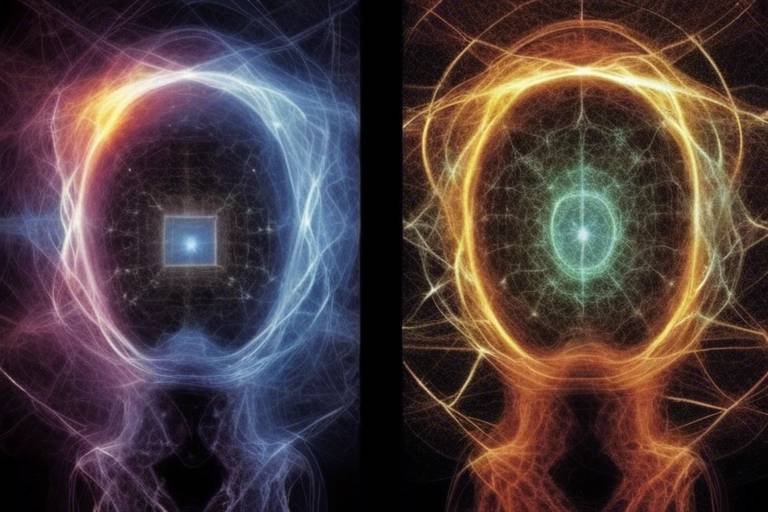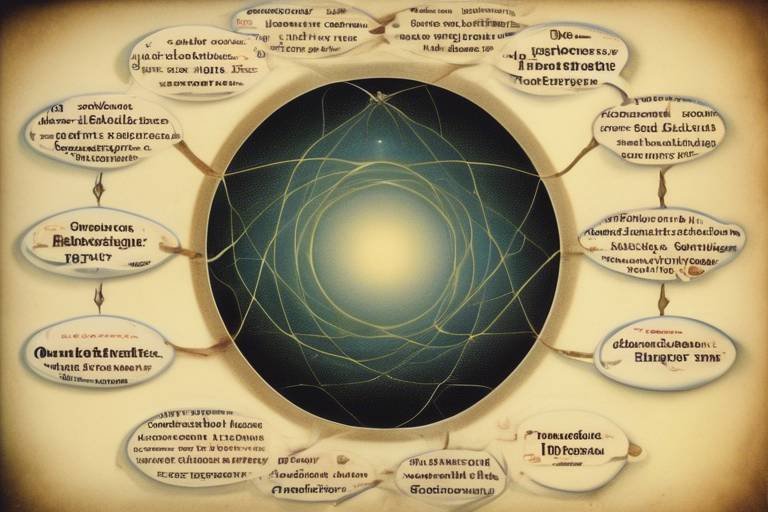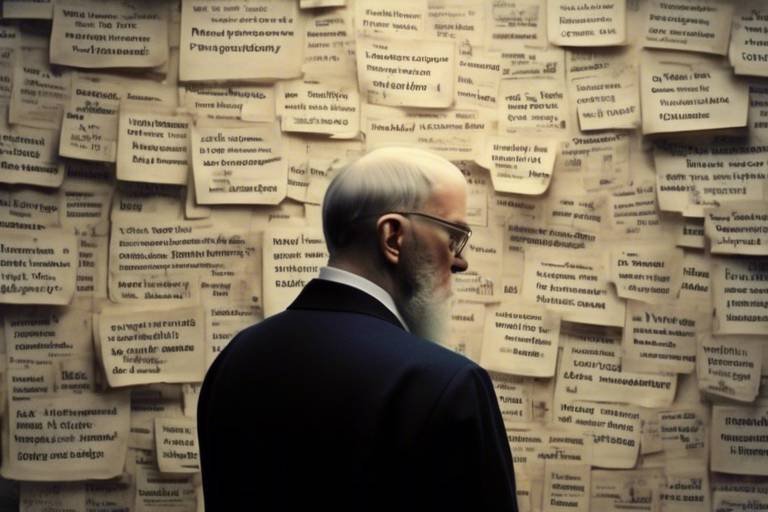Can Ontology Validate Reality?
When we think about reality, we often take it for granted. We see, hear, and experience the world around us, and it feels real, doesn’t it? But what if I told you that reality isn't as straightforward as it seems? This is where **ontology** comes into play. Ontology, a branch of philosophy, dives deep into the nature of being and existence. It challenges us to question what we know about reality and how we validate it. Can ontology truly validate reality? This question opens a Pandora's box of philosophical inquiry, leading us on a journey through the minds of great thinkers and into the heart of modern debates.
At its core, ontology seeks to understand the essence of what exists. It’s not just about physical objects; it encompasses concepts, ideas, and even the relationships between entities. Imagine trying to build a house without a blueprint. You might have bricks and wood, but without a clear understanding of how they fit together, you won’t create a stable structure. Similarly, ontology provides the framework that helps us construct our understanding of reality. It’s the blueprint of existence, guiding us through the complexities of life.
Throughout history, various philosophical perspectives have shaped our understanding of reality. Think about how different cultures and epochs have defined existence. For instance, the ancient Greeks had radically different views compared to modern philosophers. Plato’s Theory of Forms proposed that the physical world is merely a shadow of a higher reality, suggesting that true knowledge comes from understanding these abstract forms. In contrast, Aristotle focused on substance and essence, arguing that reality is grounded in the material world around us. These foundational ideas continue to influence contemporary discussions on ontology and reality.
As we transition into modern philosophy, the landscape of ontology becomes even more intricate. Existentialist thinkers like Jean-Paul Sartre and Simone de Beauvoir emphasized the importance of individual experience, suggesting that reality is subjective and shaped by personal choices. This perspective challenges the notion of a fixed, objective reality and raises questions about how we validate our experiences. Can we rely solely on our perceptions, or is there a deeper truth that transcends individual experience?
The debate between realism and anti-realism further complicates our understanding of reality. Realists argue that an objective reality exists independent of our perceptions, while anti-realists contend that reality is constructed through our interactions and interpretations. This ongoing dialogue is crucial for ontology, as it influences how we approach scientific inquiry and technological advancements. If our understanding of reality is subjective, how do we establish facts in science? This intersection of ontology with science and technology poses significant questions about the nature of truth and existence.
In the realm of artificial intelligence, ontology plays a pivotal role in shaping how machines perceive and interact with reality. By creating structured frameworks that define relationships between concepts, AI systems can better understand and interpret the world around them. This raises intriguing questions about the nature of machine consciousness and whether AI can ever truly grasp the essence of reality as humans do.
As we look ahead, the future of ontological research is ripe with possibilities. With advancements in technology and a growing interest in interdisciplinary studies, we may uncover new insights into the nature of reality. Emerging trends in quantum physics, for instance, challenge traditional notions of existence, prompting philosophers to reevaluate long-held beliefs. The dialogue between ontology and other fields will undoubtedly continue to evolve, pushing the boundaries of our understanding.
- What is ontology? Ontology is a branch of philosophy that studies the nature of being, existence, and reality, examining what entities exist and how they relate to one another.
- How does ontology relate to reality? Ontology helps us understand and validate reality by providing a framework for examining the essence of existence and the relationships between different entities.
- What are some historical perspectives on reality? Key historical perspectives include Plato's Theory of Forms, which suggests that non-material forms represent true reality, and Aristotle's Substance Theory, which emphasizes the material world.
- What is the significance of realism and anti-realism? Realism posits that an objective reality exists independent of perception, while anti-realism argues that reality is constructed through individual experiences, influencing how we approach knowledge and truth.
- How does ontology impact artificial intelligence? Ontology provides structured frameworks that help AI systems understand and interpret reality, raising questions about machine consciousness and the nature of existence.

Understanding Ontology
Ontology is a fascinating branch of philosophy that dives deep into the nature of being, existence, and reality itself. Imagine it as the philosophical toolkit we use to dissect the very fabric of what it means to exist. At its core, ontology seeks to answer profound questions like: What is there? What does it mean to exist? And how do we categorize the various entities that populate our universe?
To grasp ontology, we must first understand its fundamental concepts. It revolves around several key ideas, including:
- Being: This refers to the essence of existence. What does it mean to say something exists?
- Existence: This concept deals with the state of being, whether it's material or immaterial.
- Categories of Being: Ontology classifies entities into various categories such as physical objects, abstract concepts, and even potential entities that might not currently exist.
Ontology isn't just an academic exercise; it shapes our worldview and influences how we interact with the world around us. For instance, when we categorize things, we create a framework that helps us understand relationships and hierarchies within our reality. Think of it like organizing a messy garage: once you categorize tools, equipment, and supplies, it becomes much easier to find what you need.
Moreover, ontology intersects with other philosophical domains such as epistemology, which studies knowledge and belief. Understanding ontology is crucial because it lays the groundwork for how we perceive and validate what is real. If we can't agree on what exists, how can we have a meaningful discussion about knowledge or truth?
In essence, ontology invites us to explore the layers of existence, challenging us to question our assumptions about reality. It encourages a deeper examination of the world, leading to richer discussions about the nature of life and existence. So, whether you're pondering the existence of a chair or the abstract concept of justice, ontology provides the philosophical lens through which we can better understand the complexities of reality.
- What is ontology? Ontology is the philosophical study of being, existence, and the nature of reality.
- How does ontology differ from epistemology? While ontology focuses on what exists, epistemology deals with the nature and scope of knowledge.
- Why is ontology important? It helps us categorize and understand the world, influencing how we perceive and validate reality.

Historical Perspectives on Reality
Throughout the ages, the quest to understand reality has engaged some of the greatest minds in philosophy. Each thinker has brought forth unique perspectives that have shaped our understanding of existence. From ancient Greece to the modern era, these ideas have not only influenced philosophical discourse but have also impacted various fields, including science and technology. So, what can we learn from these historical perspectives on reality?
One of the earliest and most significant contributions to this discussion comes from the ancient Greek philosopher Plato. He proposed the Theory of Forms, suggesting that the tangible world we perceive is merely a shadow of a higher, unchanging reality represented by abstract forms. For Plato, these forms are the true essence of things—perfect and immutable—while the physical world is subject to change and decay. This dualistic view challenges us to consider whether our experiences are mere reflections of a deeper truth.
On the other hand, Aristotle, a student of Plato, took a different approach. He emphasized the concept of substance, arguing that reality is grounded in the physical world and that understanding it requires examining the essence of particular things. For Aristotle, the essence of a thing is what makes it what it is, and it exists within the object itself rather than in a separate realm of forms. This perspective laid the groundwork for a more empirical approach to understanding reality, one that values observation and experience over abstract reasoning.
As we move through history, the Enlightenment period brought forth a new wave of thinkers who began to challenge established notions of reality. Philosophers like René Descartes and David Hume questioned the reliability of human perception and the existence of an objective reality. Descartes famously stated, "I think, therefore I am," emphasizing individual consciousness as the starting point for understanding reality. Hume, on the other hand, argued that our knowledge of the world is limited to our experiences, leading to skepticism about the existence of anything beyond our perceptions.
This skepticism paved the way for the idealism of philosophers like Immanuel Kant, who suggested that while we can never know the thing-in-itself, our understanding of reality is shaped by the structures of our mind. Kant’s ideas introduce a fascinating dimension to the discussion of reality, as they imply that our perceptions are not merely passive reflections of the world but are actively constructed by our cognitive faculties.
As we delve into the 20th century, the debate surrounding reality evolved further with the emergence of existentialism. Thinkers such as Jean-Paul Sartre and Simone de Beauvoir shifted the focus from abstract concepts to individual experience and subjectivity. They argued that reality is not a fixed entity but is instead shaped by our choices and actions. This perspective challenges us to consider the implications of our freedom and responsibility in crafting our own understanding of reality.
In summary, the historical perspectives on reality provide a rich tapestry of ideas that continue to resonate today. From Plato's ideal forms to Aristotle's substance theory, and further on to existentialism, each philosophical stance invites us to question our assumptions about existence. As we reflect on these ideas, we can appreciate how they inform contemporary discussions in ontology and beyond.
- What is ontology? Ontology is the branch of philosophy that studies the nature of being, existence, and reality.
- How did Plato influence our understanding of reality? Plato's Theory of Forms suggests that the physical world is a mere reflection of a higher reality, prompting us to question the nature of existence.
- What is the main difference between Plato and Aristotle's views on reality? Plato emphasized abstract forms as the true reality, while Aristotle focused on the essence of substances in the physical world.
- How does existentialism relate to reality? Existentialism posits that reality is shaped by individual experiences and choices, challenging traditional notions of an objective reality.

Plato's Theory of Forms
Plato's Theory of Forms is a captivating philosophical concept that has intrigued thinkers for centuries. At its core, this theory posits that the material world we perceive through our senses is merely a shadow of a higher, more real realm of abstract entities known as "Forms" or "Ideas." Imagine walking through a gallery filled with paintings; each painting represents an object or concept, but the true essence of that object—the Form—exists beyond the canvas. This analogy illustrates how Plato believed that the physical manifestations we encounter are just imitations of these perfect Forms.
According to Plato, these Forms are not just random ideals; they are the most accurate representation of reality. For instance, the Form of Beauty itself is perfect and unchanging, while the beautiful things we see around us are subject to decay and imperfection. This leads us to ponder: if the physical world is so transient and flawed, how can we ever truly understand what is real? Plato argued that through philosophical reasoning and intellectual pursuit, one could grasp the essence of these Forms, thereby gaining deeper insights into the nature of reality.
One of the most significant implications of Plato's Theory of Forms is its impact on epistemology—the study of knowledge. If reality is divided into two realms, how do we acquire knowledge? Plato suggested that knowledge is not merely a collection of facts but rather a recollection of the truths we once knew in the realm of Forms before our souls entered the physical world. This perspective raises intriguing questions about the nature of learning and understanding, suggesting that education is a process of remembering rather than acquiring new information.
Furthermore, Plato's theory has profound implications for ethics and morality. If there exists a perfect Form of Goodness, then our moral actions can be evaluated against this ideal. In this sense, ethical behavior is not just about adhering to societal norms but striving to align one's actions with the ultimate Form of Good. This perspective encourages individuals to seek higher truths and cultivate a deeper understanding of their moral obligations.
Ultimately, Plato's Theory of Forms challenges us to reconsider our perceptions of reality. It invites us to look beyond the surface and question the validity of what we see. Are we merely experiencing shadows on the wall, as illustrated in his famous Allegory of the Cave, or can we break free and access the true reality of the Forms? This ongoing inquiry continues to resonate in philosophical discussions today, making Plato's insights as relevant now as they were in ancient Greece.
- What are the Forms in Plato's theory? The Forms are abstract, perfect, unchangeable concepts or ideals that exist in a higher realm, representing the true essence of objects and ideas in the material world.
- How does Plato's Theory of Forms relate to knowledge? Plato believed that knowledge is a recollection of the truths known in the realm of Forms, suggesting that learning is about remembering rather than acquiring new information.
- What is the significance of the Allegory of the Cave? The Allegory of the Cave illustrates how individuals can be trapped in a world of illusions, only perceiving shadows of reality, and emphasizes the importance of philosophical enlightenment to access true knowledge.

Aristotle's Substance Theory
Aristotle's Substance Theory is a cornerstone of his ontological framework, offering a profound lens through which we can examine the essence of reality. Unlike Plato, who posited that the material world is merely a shadow of a higher realm of forms, Aristotle grounded his philosophy in the tangible. He proposed that substances are the fundamental realities that make up the world, and these substances are characterized by their essence and existence. In simpler terms, Aristotle believed that everything we encounter in the world is made up of substances, which are individual entities that possess their own unique properties and characteristics.
At the heart of Aristotle's theory is the distinction between substance and accidents. Substances are what something is, while accidents are the attributes or qualities that can change without altering the essence of the substance itself. For example, consider a tree. The tree itself—its trunk, branches, and leaves—represents the substance. However, the color of the leaves or the height of the tree can change, and these variations are considered accidents. This distinction is crucial because it allows us to understand that while the accidents may vary, the essence of the tree as a living organism remains constant.
Aristotle further categorized substances into two types: primary substances and secondary substances. Primary substances are individual entities, such as a specific dog or a particular tree, while secondary substances refer to the species or genus to which these individuals belong, like 'dog' or 'tree'. This classification not only emphasizes the individuality of each substance but also situates it within a broader context of understanding. Aristotle's approach encourages us to explore the relationships between individual entities and their categories, providing a more comprehensive view of reality.
In addition to this categorization, Aristotle introduced the concept of hylomorphism, which asserts that every substance is composed of both matter and form. Matter refers to the physical substance of an object, while form represents its essence or what it means to be that particular object. This duality helps bridge the gap between the physical and the conceptual, allowing us to appreciate how substances exist in both a tangible and abstract sense. For instance, a statue is made of marble (matter), but its form is the shape and design that define it as a statue. This interplay between matter and form is fundamental to understanding Aristotle's ontological perspective.
Aristotle's Substance Theory has profound implications for how we perceive reality. It challenges us to consider not just what exists, but what it means for something to exist. By focusing on substances and their properties, we can engage in a more nuanced discussion about the nature of reality, moving beyond mere appearances to the underlying truths that define our world. This philosophical inquiry invites us to ask essential questions about the essence of things, urging us to look deeper into the fabric of existence.
In conclusion, Aristotle's Substance Theory provides a robust framework for understanding reality that contrasts sharply with Plato's idealism. By emphasizing the importance of individual substances and their essences, Aristotle lays the groundwork for a more empirically grounded approach to ontology. This perspective not only enriches our understanding of the natural world but also informs contemporary debates about the nature of existence, making it a vital part of philosophical discourse.
- What is the main difference between Aristotle's and Plato's views on reality?
Aristotle focuses on tangible substances and their essences, while Plato emphasizes abstract forms that represent higher truths. - How does Aristotle's Substance Theory apply to modern philosophy?
It influences contemporary discussions about identity, existence, and the nature of objects in both philosophy and science. - What role does hylomorphism play in understanding substances?
Hylomorphism illustrates the relationship between matter and form, helping us grasp how substances are defined and understood.

Modern Ontological Perspectives
In the contemporary landscape of philosophy, ontology has undergone a remarkable transformation, evolving to address the complexities of reality in a world that is increasingly influenced by science and technology. The modern ontological discourse is rich and varied, with thinkers challenging traditional views and proposing new frameworks that reflect our understanding of existence today. This shift is not merely academic; it resonates with our daily experiences and the ways we interpret the world around us.
One significant aspect of modern ontology is the rise of social constructivism, which posits that our understanding of reality is largely shaped by social processes and interactions. Unlike classical ontologies that sought to define reality as an objective entity, social constructivism emphasizes the role of human perception and context. This perspective suggests that what we consider "real" is often a product of collective agreement and cultural narratives. For instance, concepts such as race, gender, and even technology are seen as constructs that gain meaning through societal recognition and discourse.
Moreover, the debate between realism and anti-realism has become a pivotal topic in modern ontology. Realists argue that an objective reality exists independent of our perceptions, while anti-realists contend that reality is inherently subjective, shaped by our experiences and interpretations. This dichotomy raises profound questions: Can we ever truly know reality? Or are we forever trapped in our subjective lenses? The implications of these debates stretch beyond philosophy into fields like science, where the nature of observations and measurements is constantly scrutinized.
Another modern perspective is rooted in phenomenology, which focuses on individuals' lived experiences as the foundation for understanding reality. Phenomenologists assert that reality is not a static entity but is instead revealed through personal experiences and consciousness. This approach invites us to consider how our perceptions and emotions shape our understanding of the world. Think about it: two people can witness the same event but interpret it entirely differently based on their backgrounds and feelings. This highlights the fluid nature of reality and challenges the idea of a singular truth.
Furthermore, the advent of postmodernism has significantly influenced ontological discussions. Postmodern thinkers question the very foundations of knowledge and reality, suggesting that multiple truths coexist and that grand narratives can be misleading. This perspective encourages a more pluralistic view of existence, where diverse voices and experiences are acknowledged. In a world that is increasingly interconnected, postmodern ontology resonates with the idea that our understanding of reality is not monolithic but rather a tapestry woven from various threads of human experience.
As we navigate these modern ontological perspectives, it becomes clear that our understanding of reality is not fixed but is instead a dynamic interplay of various factors. The dialogue between traditional and contemporary views enriches our philosophical landscape, inviting us to explore deeper questions about existence, perception, and the nature of reality itself. In this ever-evolving discourse, the challenge lies in reconciling these diverse perspectives to form a cohesive understanding of what it means to be real.
- What is ontology? Ontology is a branch of philosophy that studies the nature of being, existence, and reality.
- How does modern ontology differ from traditional ontology? Modern ontology incorporates contemporary influences such as social constructivism and phenomenology, emphasizing subjective experience and cultural factors.
- What is the significance of the realism vs. anti-realism debate? This debate questions whether an objective reality exists independent of human perception, impacting various fields including science and philosophy.
- How does postmodernism influence ontology? Postmodernism challenges the idea of singular truths, advocating for multiple perspectives and acknowledging the complexity of human experience.

Existentialism and Reality
When we dive into the realm of existentialism, we encounter a fascinating perspective on reality that challenges traditional notions of existence. At its core, existentialism posits that reality is not a fixed entity waiting to be discovered; rather, it is shaped by individual experiences and perceptions. Think of reality as a canvas, where each person's brush strokes create a unique masterpiece. This idea emphasizes the importance of subjectivity—the notion that our understanding of what is real is deeply intertwined with our personal experiences, emotions, and choices.
Existentialist thinkers, such as Jean-Paul Sartre and Simone de Beauvoir, argue that we are not merely passive observers of reality. Instead, we are active participants in its creation. Sartre famously declared, "Existence precedes essence," suggesting that we are born into a world devoid of predetermined meaning. It's up to us to carve out our own realities through our actions and decisions. This perspective raises intriguing questions: If reality is subjective, can we ever truly understand someone else's experience? How do our choices shape not only our lives but also the world around us?
Moreover, existentialism invites us to confront the inherent absurdity of life. The universe may not provide clear answers or a definitive purpose, leading to feelings of anxiety and disorientation. Yet, this very absurdity can be liberating. By acknowledging that we are free to define our own reality, we can embrace the chaos and uncertainty of existence. It’s like standing on the edge of a cliff, feeling the rush of wind and the thrill of possibility, knowing that the leap into the unknown is entirely ours to make.
In practical terms, existentialism encourages us to reflect on our choices and the impact they have on our understanding of reality. It challenges us to ask ourselves questions like:
- What values guide my decisions?
- How do my experiences shape my perception of reality?
- In what ways can I take responsibility for my own existence?
Ultimately, existentialism offers a profound lens through which to view reality. It reminds us that while we may share a common world, our individual experiences create a tapestry of realities, each vibrant and distinct. By embracing this complexity, we can develop a richer understanding of not just ourselves but also the diverse perspectives that populate our shared existence.
- What is existentialism? Existentialism is a philosophical movement that emphasizes individual existence, freedom, and choice, suggesting that individuals create their own meaning and reality.
- How does existentialism view reality? Existentialism posits that reality is subjective, shaped by personal experiences and choices rather than being an objective truth.
- Who are some key figures in existentialism? Notable existentialist philosophers include Jean-Paul Sartre, Simone de Beauvoir, and Friedrich Nietzsche.
- What are the implications of existentialism for personal responsibility? Existentialism asserts that individuals are responsible for creating their own values and meanings in life, which can lead to empowerment but also anxiety.

Realism vs. Anti-Realism
When diving into the philosophical waters of realism and anti-realism, it’s like stepping onto a seesaw—one side insists that an objective reality exists independent of our perceptions, while the other argues that our understanding of reality is fundamentally shaped by our subjective experiences. This debate is not just academic; it influences how we interpret everything from scientific discoveries to everyday interactions.
At its core, realism posits that there is a world out there that remains constant, regardless of whether we perceive it or not. Think of it as a sturdy tree standing tall in a forest, existing whether or not anyone is around to admire its grandeur. Realists believe that our senses and scientific methods can uncover truths about this external reality, leading to a shared understanding of the world. This perspective is often associated with the natural sciences, where objective measurements and observations aim to reveal the underlying laws of nature.
Conversely, anti-realism challenges this notion, suggesting that what we consider to be "real" is heavily colored by our individual experiences, cultural contexts, and linguistic frameworks. Imagine trying to describe the color blue to someone who has never seen it; your description would inevitably fall short, as their understanding is limited by their experiences. Anti-realists argue that our perceptions and interpretations create our realities, making it impossible to claim an objective truth. This perspective is particularly influential in fields like social sciences and humanities, where subjective experience plays a crucial role in shaping knowledge.
The implications of this debate stretch far and wide, affecting various domains of inquiry. For instance, in the realm of science, a realist might argue that scientific theories aim to describe an objective reality, while an anti-realist might contend that these theories are merely useful tools for navigating our experiences. This leads to critical questions such as:
- Can we ever truly know the objective reality, or are we forever confined to our subjective interpretations?
- How do our cultural backgrounds shape our understanding of what is real?
- In what ways do scientific advancements challenge or reinforce the realist perspective?
Ultimately, the realism versus anti-realism debate is not merely an academic exercise; it has profound implications for how we understand the world and our place within it. As we navigate this complex landscape, it becomes clear that both perspectives offer valuable insights. Realism provides a foundation for scientific inquiry and objective understanding, while anti-realism reminds us of the richness and diversity of human experience. Together, they create a more nuanced picture of reality, one that acknowledges both the existence of an external world and the subjective lenses through which we view it.
- What is realism in philosophy? Realism is the view that there exists an objective reality independent of our perceptions.
- What is anti-realism? Anti-realism is the belief that our understanding of reality is shaped by subjective experiences and cultural contexts.
- How do realism and anti-realism affect scientific inquiry? Realism supports the idea that scientific theories describe an objective reality, while anti-realism suggests they are tools for navigating our subjective experiences.

Implications for Science and Technology
When we think about the intersection of ontology with science and technology, it opens up a fascinating dialogue. Imagine trying to build a bridge without understanding the materials and forces at play—this is akin to scientific inquiry without a solid ontological foundation. Ontology provides the framework through which scientists can categorize and validate their findings. It raises questions about what constitutes reality, which in turn influences how we conduct experiments and interpret data.
In the realm of science, ontology helps researchers define the entities they study. For instance, in biology, understanding what it means to be a "species" is not just a matter of classification; it touches upon deeper questions of existence and essence. The implications are profound: if we misinterpret the nature of species, we risk skewing conservation efforts, ecological studies, and even medical research that relies on understanding genetic variations. This interplay between ontology and scientific classification is crucial for accurate research outcomes.
Moreover, technology is increasingly shaped by ontological considerations. Take artificial intelligence (AI), for example. AI systems rely on ontological frameworks to interpret data and understand the world. When we program these systems, we are essentially instilling a particular view of reality within them. This raises critical questions: What do we want these machines to perceive as 'real'? Are we embedding biases into their understanding of the world? The ontological assumptions we make can lead to significant consequences in how technology interacts with human life.
Furthermore, the rise of big data has highlighted the importance of ontology in organizing vast amounts of information. Without a clear ontological structure, data can become chaotic and unmanageable. Organizations are now investing in ontological frameworks to ensure that their data is not only accurate but also meaningful. This leads to better decision-making and more effective strategies across various fields, from healthcare to marketing.
To illustrate the impact of ontology on both science and technology, consider the following table that summarizes key areas of influence:
| Field | Ontological Implications | Examples |
|---|---|---|
| Biology | Classification of species and genetic understanding | Conservation efforts, medical research |
| Artificial Intelligence | Data interpretation and machine learning | Bias in AI decision-making, ethical considerations |
| Big Data | Data organization and meaningful analysis | Healthcare analytics, business intelligence |
In conclusion, the implications of ontology for science and technology are vast and multifaceted. As we continue to explore these domains, it becomes increasingly clear that our understanding of reality shapes our methodologies and tools. By grounding our scientific inquiries and technological advancements in robust ontological frameworks, we can enhance our understanding and interaction with the world around us.
- What is ontology? Ontology is a branch of philosophy that studies the nature of being, existence, and reality.
- How does ontology influence science? Ontology helps define the entities studied in scientific research, impacting classification and interpretation of findings.
- What role does ontology play in artificial intelligence? Ontological frameworks guide how AI systems perceive and interpret data, influencing their decision-making processes.
- Why is ontology important in big data? A clear ontological structure is essential for organizing and making sense of large datasets, leading to more effective analysis.

Ontology in Artificial Intelligence
When we think about artificial intelligence (AI), the first images that come to mind might be of robots, complex algorithms, or maybe even futuristic scenarios where machines think like humans. But beneath the surface of these advanced technologies lies a fascinating philosophical underpinning: ontology. Ontology, the study of being and existence, provides a framework that helps us understand how AI systems perceive and interact with the world around them. It’s not just about programming machines to perform tasks; it’s about giving them a structured way to interpret the complexities of reality.
At its core, ontology in AI deals with the categorization of entities and their relationships within a given context. For instance, think about how humans categorize everything from objects to concepts. We have a mental model of the world that informs our interactions. AI systems, particularly those designed for tasks like natural language processing or knowledge representation, require a similar framework to make sense of the data they encounter. This is where ontological models come into play.
Consider the following aspects of ontology in AI:
- Knowledge Representation: Ontologies help in structuring knowledge in a way that machines can understand. By defining concepts and relationships, AI can process information more effectively.
- Semantic Web: Ontology is crucial for the development of the Semantic Web, where data is interconnected and machine-readable, enabling better information retrieval and interoperability.
- Natural Language Understanding: For AI to understand human language, it must grasp the underlying meanings and contexts, which is facilitated by ontological frameworks.
Moreover, the design of ontologies in AI is not a one-size-fits-all approach; it varies significantly based on the application. For example, an ontology used in healthcare will differ vastly from one used in e-commerce. This adaptability is essential for ensuring that AI systems can operate effectively in diverse environments. The challenge lies in creating ontologies that are both comprehensive and flexible enough to accommodate new information and evolving contexts.
As we move forward, the implications of ontology in AI extend beyond mere functionality. They raise profound questions about the nature of reality as perceived by machines. Can a machine truly "understand" reality, or is it merely processing data without any genuine comprehension? This philosophical inquiry is critical as we develop more sophisticated AI systems that increasingly become integrated into our daily lives.
Furthermore, the ethical considerations surrounding the use of ontologies in AI cannot be overlooked. As AI systems begin to make decisions that affect human lives—be it in healthcare, finance, or autonomous driving—the need for transparent and fair ontological frameworks becomes paramount. We must ask ourselves: How do we ensure that the knowledge represented within these systems is accurate, unbiased, and reflective of the diverse realities of human experience?
In conclusion, ontology is not just an abstract philosophical concept; it is a vital component of artificial intelligence that shapes how machines interpret the world. As we continue to innovate and integrate AI into various sectors, understanding the ontological foundations of these technologies will be crucial for harnessing their full potential while navigating the ethical landscapes they inhabit.
- What is ontology in the context of AI? Ontology in AI refers to the structured representation of knowledge that helps machines understand and process information about the world.
- How does ontology affect AI's performance? A well-designed ontology enhances an AI system's ability to categorize and interpret data, leading to more accurate and meaningful outputs.
- Can AI truly understand reality? While AI can process and analyze data, its understanding is fundamentally different from human comprehension, often lacking emotional and contextual depth.

Future Directions in Ontological Research
As we venture further into the complexities of reality, the field of ontology is poised for exciting transformations. The rapid advancements in technology, particularly in artificial intelligence and virtual reality, are compelling philosophers and researchers to rethink traditional ontological frameworks. One of the most intriguing future directions lies in the integration of ontological principles with cognitive science. This interdisciplinary approach aims to bridge the gap between how we understand reality and how our brains process information. Imagine combining the abstract theories of existence with the tangible workings of the mind; this could lead to groundbreaking insights into both ontology and human cognition.
Moreover, the rise of digital realities—from virtual environments to augmented experiences—poses significant questions about what constitutes "real" in a world increasingly dominated by technology. As we interact with these digital realms, the lines between the material and the immaterial blur, prompting ontologists to explore new definitions of existence. For instance, can a virtual entity be considered real? This question not only challenges our existing ontological paradigms but also invites a re-evaluation of ethics and identity in digital spaces.
Another promising avenue for ontological research is the exploration of multiverse theories. These theories suggest the existence of multiple, perhaps infinite, realities coexisting alongside our own. The implications of such theories could reshape our understanding of existence itself, leading to a more pluralistic view of reality. Engaging with these ideas requires a collaborative effort among philosophers, physicists, and even technologists, as they seek to reconcile scientific theories with ontological inquiry.
Furthermore, the growing interest in environmental ontology reflects a shift towards understanding the interconnectedness of beings within ecological systems. This perspective emphasizes the importance of non-human entities and their roles in shaping reality. It challenges the anthropocentric view that has long dominated philosophical discourse and pushes for a more inclusive understanding of existence that recognizes the agency of all beings, human and non-human alike.
As we look to the future, it becomes evident that ontological research is not merely an academic pursuit; it is a vital exploration that can inform various fields, from ethics to technology. The questions we ask today will shape the ontological inquiries of tomorrow. To facilitate this ongoing dialogue, we can anticipate the emergence of new methodologies that blend empirical research with philosophical analysis, fostering a richer understanding of reality.
- What is ontology?
Ontology is a branch of philosophy that studies the nature of being, existence, and reality.
- How does ontology relate to artificial intelligence?
Ontology in AI helps define how machines perceive and interact with reality, influencing their decision-making processes.
- Why is environmental ontology important?
It emphasizes the interconnectedness of all beings and challenges the human-centered view of existence.
- What are multiverse theories?
These theories propose the existence of multiple realities, which can reshape our understanding of existence itself.
Frequently Asked Questions
- What is ontology?
Ontology is a branch of philosophy that investigates the nature of being, existence, and reality. It seeks to understand what entities exist and how they can be categorized and related within a framework of understanding.
- How does ontology relate to reality?
Ontology provides the foundational concepts that help us explore and validate what we consider to be real. Different ontological perspectives can lead to varying interpretations of reality, affecting how we understand our world.
- What are some historical perspectives on reality?
Throughout history, philosophers like Plato and Aristotle have offered distinct theories about reality. Plato's Theory of Forms suggests that non-material forms are the true essence of reality, while Aristotle's Substance Theory emphasizes the physical substances that make up our world.
- What is the difference between realism and anti-realism?
Realism posits that an objective reality exists independent of our perceptions, while anti-realism argues that reality is dependent on our interpretations and experiences. This debate has significant implications for how we understand and validate what is real.
- How does ontology impact science and technology?
Ontology influences scientific inquiry and technological advancements by shaping the frameworks through which we understand and categorize knowledge. It raises questions about the nature of reality that scientists and technologists must consider in their work.
- What role does ontology play in artificial intelligence?
In AI development, ontology helps define how machines perceive and categorize information about the world. This understanding is crucial for creating systems that can interact with and interpret reality in meaningful ways.
- What are the future directions in ontological research?
As our understanding of reality evolves, ontological research is likely to explore new trends, such as the implications of virtual realities and advancements in technology that challenge traditional ontological views.



















